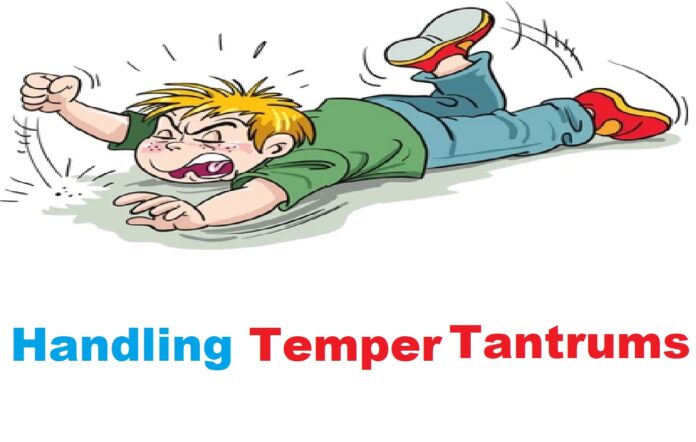(By Dr Megha Sarin, Clinical Psychologist, Email: megha.manobhaavcare@gmail.com)
Temper tantrums seem to be every parent’s worst nightmare. I have seen children throwing a tantrum in malls and markets by lying down on the floor, crying excessively, hitting themselves etc., and these types of behaviours are not only stressful but also embarrassing for parents. Most of the time in order to stop the temper tantrums we as parents either shout at our children or give in to their demands, but both of these extreme behaviours are not very effective ways of dealing with such situations, because both will ultimately increase the tantrums instead of stopping them. Then what should we do? Well to understand that, let us first look at temper tantrums through the child’s perspective.
Why does a child throw a temper tantrum?
Temper tantrum basically refers to an emotional outburst characterized by screaming, crying, lying on the floor, throwing things and other similar behaviours. Tantrums usually occur during meal time, bed time, when the child’s demands are not met, discontinuing with the child’s favourite activity, or when parents pay more attention to other people in presence of the child.
In younger children temper tantrums are a way of expressing their frustrations, getting their demands fulfilled, avoiding certain activities, or demanding attention. However as children grow older they may throw tantrums because of lack of appropriate problem solving and emotion regulation skills. In other words, due to past experiences they may have learnt that temper tantrums are a good way of getting through problems and of expressing their emotions. Thus, reinforcement of temper tantrums increases the likelihood of their occurrence in the future. Now, of course we as parents would never want this to happen, however many a times we may unintentionally encourage the occurrence of temper tantrums. Then what can be done to save ourselves from the frustration and embarrassment of tantrums? Let’s have a look.
MANAGING TEMPER TANTRUMS
I would like to share my experience here, in my OPD a 5 year old was brought by parents with the main complaint of throwing excessive tantrums, he would usually lie on the floor start crying and refused to get up, as the session progressed I realised that his father would usually hit and scold him during the tantrum, his mother would stop him and talk to him during the tantrum and his grandparents would usually give in to his demands. Did you notice something? The first error was intervening during the tantrum as it gave undue attention to the tantrum, second, was inconsistency between parents and grandparents behaviours, and of course third by displaying these types of behaviours appropriate skills to cope with difficult situations were not modelled, infact these responses will further increase the tantrums and make the child more aggressive. Of course, none of us would do all of this purposefully, I do understand that such situations can be very frustrating and irritating for parents but if we try to follow some simple steps we can definitely reduce this frustration and make our lives easier.
Maintain your Calm. Since the main aim is to calm your child down, controlling your own anger or frustration is very important because, increased aggression from your side will definitely increase your child’s aggression. Moreover, the child is more likely to model parent’s behaviour and is more likely to use aggression in future problem situations. This can lead to more negative behaviours in the future.
Do not intervene during the tantrum. Intervening during the tantrum when it is in a full blown stage, can give undue attention to the child and may increase the likelihood of its occurrence in the future, thus, even if it is embarrassing do not intervene or try to give any explanations during the tantrum.
Allow a cool down period. Once the tantrum is over give your child a cool down period and encourage them to introspect their behaviours and also discuss how this could have been avoided. This will help them feel understood, and also encourage them to focus on alternative solutions and better ways of dealing with such situations.
Distract your child. By being more attentive to your child’s moods you can distract your child when he looks frustrated and when his temper is at a milder level. The key is to be sensitive to mood changes in your child, so as to facilitate timely intervention. You can do this by distracting him towards other interesting activities.
Ignore: In some cases ignoring the tantrum can help in dealing effectively with it, at the same time not allowing the child to fulfil his demands. For example, if the child has access to attain a packet of chips from the kitchen in that case other techniques can work better. However, if your child has not developed language skills or is not able to express his needs encourage them to point out to or draw what they want.
Be consistent and clear. You need to be clear on what you are comfortable with when it comes to your child and his behaviour. Thus setting clear boundaries of what is allowed and not allowed is very important. Moreover, once these boundaries have been set parents need to consistently follow it.
Thus, if we as parents reinforce child’s behaviour at the right time, maintain our calm during problem situations, set clear and consistent rules and keep trying consistently we can definitely bring a change in the child’s behaviour.


